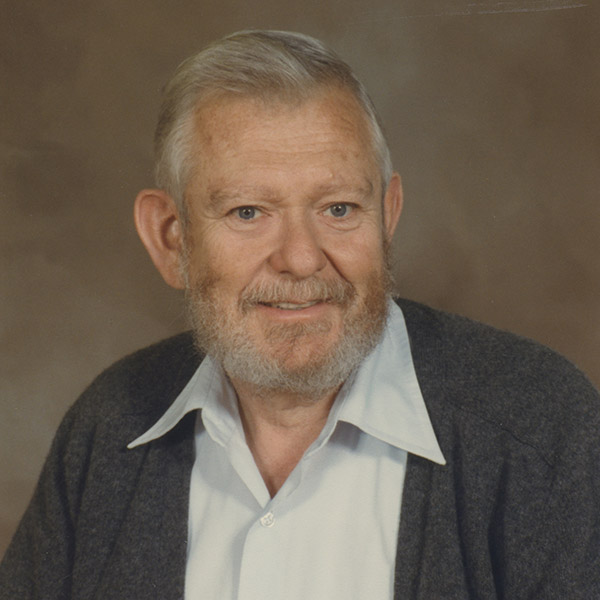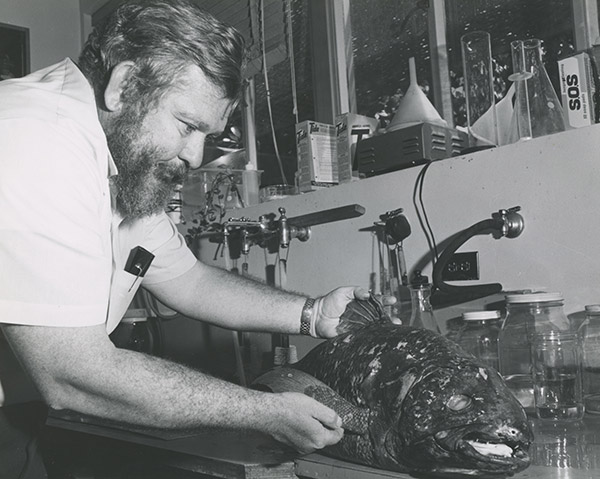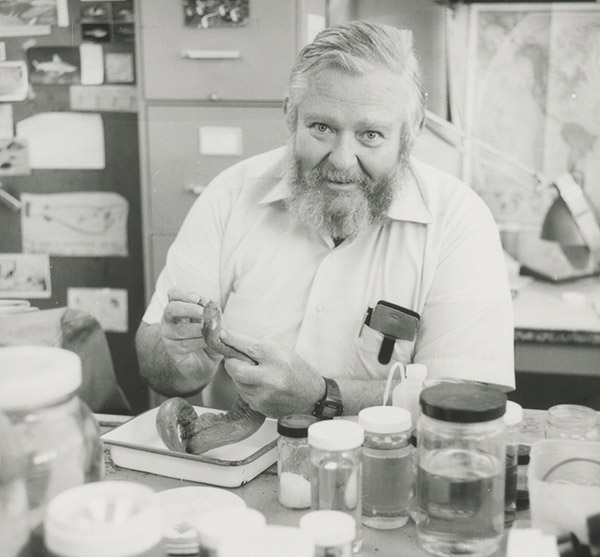
Richard Rosenblatt: Renowned Scripps Oceanography Ichthyologist
World-leading scientist in fish systematics and biology
Published Date
By:
- Cindy Clark
Share This:
Article Content
Richard H. Rosenblatt, a world-renowned ichthyologist and professor associated with Scripps Institution of Oceanography, UC San Diego, since 1958, died at his home in

Richard Rosenblatt
San Diego, Calif., on Oct. 30, 2014, from natural causes. He was 83 years old.
Rosenblatt was professor emeritus of marine biology and a noted research zoologist. He also held the distinction of curator emeritus of the Marine Vertebrate Collection, part of the Scripps Oceanographic Collections, the largest and most comprehensive university-based oceanographic collections in the world.
"Scripps has lost one of its long-time treasures,” said Margaret Leinen, director of Scripps Oceanography. “Dick was a great source of knowledge about the marine environment and a true inspiration to generations of marine scientists."
Rosenblatt’s research focused on the geographic distribution and evolution of fishes and the biology and history of shore and island animals. As curator, he was responsible for overseeing approximately two million preserved specimens, representing more than 5,500 species, in an invaluable collection serving scientists worldwide as a unique, enormous reference library for basic research and ecological studies. The collection also plays an integral role in the support of graduate education and research at Scripps, a role championed by Rosenblatt. It is one of the largest collections of deep-sea and pelagic fishes in the world, as well as the premiere collection of shore fishes from the eastern Pacific.
"Dick was a giant in the ichthyological community," said Phil Hastings, curator of marine vertebrates at Scripps. "His legacy includes not only a significant body of careful and detailed research on the systematics and evolution of fishes, ranging from shallow-water reef fishes to obscure groups of deep-sea fishes, but also an impressive cadre of students who learned fishes at his feet."
"Dick's influence on our collection was profound, not just his research and collecting but his adherence to the highest standards of curation. We will miss him," said H.J. Walker, Scripps museum scientist.

Richard Rosenblatt with a specimen in the Scripps Marine Vertebrate Collection
Born in Kansas City, Mo., on Dec. 21, 1930, Rosenblatt attended the University of California, Los Angeles, and received a B.A. degree in 1953, Master’s degree in 1954, and a Ph.D. in 1959, all in zoology. He joined the research staff of Scripps Oceanography as a research zoologist in 1958, serving primarily as curator of the fish collection during the day and writing his Ph.D. dissertation at night. He was appointed a full professor of marine biology at Scripps in 1972.
His interest in fishes is traced back to his early life. Moving around frequently as a child, Rosenblatt became a voracious reader, a pattern that continued throughout his life. He began reading and learning about, and keeping, fishes at an early age. During his years at UCLA, he was inspired by several notable faculty members who encouraged his interest and education in ichthyology and biological sciences. At Scripps, Rosenblatt’s early career was guided by the preeminent systematic ichthyologist and naturalist Carl Hubbs. Rosenblatt became curator of the Scripps Marine Vertebrate Collection as the collection was entering an era of growth with the invention of scuba and ship-towed, deep-sea trawls and the increased dedication of Scripps research vessels to the collection of biological specimens.
As a seagoing scientist, Rosenblatt led expeditions throughout his career to collect specimens and train graduate students. He was passionate about teaching and took a special interest in educating people about fishes and inspiring others to conduct research on them. He loved overseeing the Scripps Marine Vertebrate Collection, which he often lauded as one of the world’s leading fish collections embedded in a university setting, exposing students to diverse disciplines and providing interactions with leading scientists of those disciplines.
Rosenblatt served as director of Scripps Aquarium-Museum from 1961 until 1965 and his chief responsibility was planning for its future. He decided the aquarium should employ a full-time professional aquarist and offered the position to Don Wilkie, who eventually served as aquarium director. Rosenblatt remained involved as chairman of the Aquarium Advisory Committee.
“He played a major role in planning the new aquarium, Birch Aquarium at Scripps, exhibit program and in training aquarium staff in ichthyology,” said Wilkie.“He also assisted in collecting specimens for the new facility.The quality of the exhibit program benefited greatly from his input and assistance.”

Richard Rosenblatt works inside the Scripps Marine Vertebrate Collection
Rosenblatt served as chairman of the Scripps Graduate Department from 1980 to 1985, and again from 1990 to1995, overseeing graduate education with an interdisciplinary research focus in marine and earth sciences. As a research and teaching institution, Scripps is engaged in ocean and earth science worldwide and as chair, Rosenblatt coordinated multidisciplinary education programs leading to Ph.D. degrees in oceanography, marine biology, and earth sciences.
Rosenblatt had a deep and lasting commitment to teaching evolutionary biology. This continued after his retirement when he and his late wife, Glenda, generously sponsored the Richard H. and Glenda G. Rosenblatt Lectureship in Evolutionary Biology at Scripps. This award is part of an endowed series of annual lectures by distinguished evolutionary biologists.
Rosenblatt was a fellow of the San Diego Natural History Society and a member of the American Association for the Advancement of Science, the American Society of Zoologists, the Society for the Study of Evolution, and Sigma Xi. He is a past president of the American Society of Ichthyologists and Herpetologists. He authored nearly 100 scientific papers.
Rosenblatt is survived by daughters Lisa of Mercer Island, Wash., and Denise of Washington, D.C., and three granddaughters and one grandson. Rosenblatt’s wife, Glenda, who also worked at Scripps Institution of Oceanography at Scripps Aquarium in the 1980s and ‘90s, died in April 2014. His first wife, Barbara, died in 1985.
Colleagues wishing to express condolences are invited to submit messages for web posting to scrippsnews@ucsd.edu.
Arrangements for memorial services will be forthcoming.
Share This:
You May Also Like
Stay in the Know
Keep up with all the latest from UC San Diego. Subscribe to the newsletter today.


